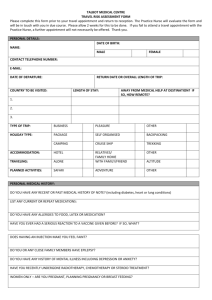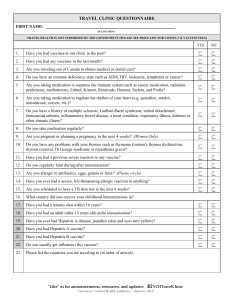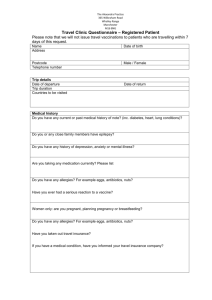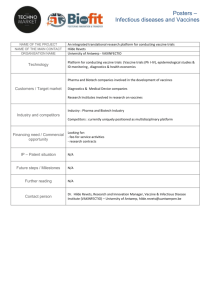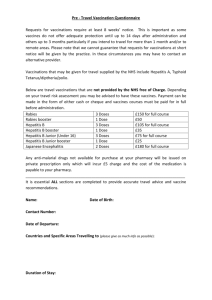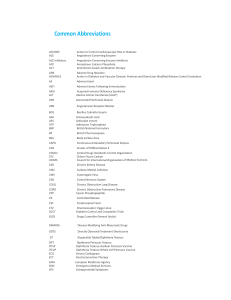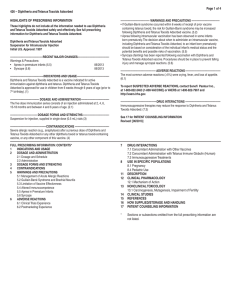Hurricanes: Immunizations Can Protect Your Health
advertisement
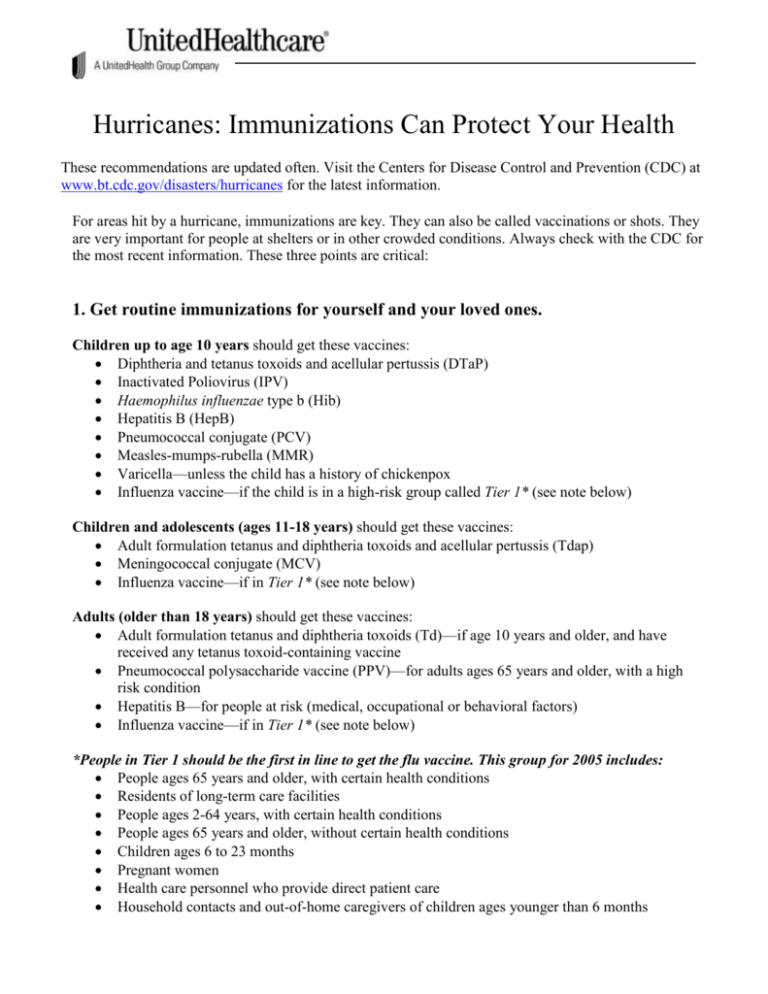
Hurricanes: Immunizations Can Protect Your Health These recommendations are updated often. Visit the Centers for Disease Control and Prevention (CDC) at www.bt.cdc.gov/disasters/hurricanes for the latest information. For areas hit by a hurricane, immunizations are key. They can also be called vaccinations or shots. They are very important for people at shelters or in other crowded conditions. Always check with the CDC for the most recent information. These three points are critical: 1. Get routine immunizations for yourself and your loved ones. Children up to age 10 years should get these vaccines: Diphtheria and tetanus toxoids and acellular pertussis (DTaP) Inactivated Poliovirus (IPV) Haemophilus influenzae type b (Hib) Hepatitis B (HepB) Pneumococcal conjugate (PCV) Measles-mumps-rubella (MMR) Varicella—unless the child has a history of chickenpox Influenza vaccine—if the child is in a high-risk group called Tier 1* (see note below) Children and adolescents (ages 11-18 years) should get these vaccines: Adult formulation tetanus and diphtheria toxoids and acellular pertussis (Tdap) Meningococcal conjugate (MCV) Influenza vaccine—if in Tier 1* (see note below) Adults (older than 18 years) should get these vaccines: Adult formulation tetanus and diphtheria toxoids (Td)—if age 10 years and older, and have received any tetanus toxoid-containing vaccine Pneumococcal polysaccharide vaccine (PPV)—for adults ages 65 years and older, with a high risk condition Hepatitis B—for people at risk (medical, occupational or behavioral factors) Influenza vaccine—if in Tier 1* (see note below) *People in Tier 1 should be the first in line to get the flu vaccine. This group for 2005 includes: People ages 65 years and older, with certain health conditions Residents of long-term care facilities People ages 2-64 years, with certain health conditions People ages 65 years and older, without certain health conditions Children ages 6 to 23 months Pregnant women Health care personnel who provide direct patient care Household contacts and out-of-home caregivers of children ages younger than 6 months 2. Get vaccines to help prevent diseases that can occur due to problems caused by a hurricane. People who have been displaced and are living in crowded group settings such as shelters should have the following vaccines: Influenza. People ages 6 months and older should get this. Children ages 8 years or younger should get two doses, at least one month apart. Varicella. People older than age 12 months should receive one dose—unless they have a clear history of chickenpox. MMR. People older than age 12 months, and born after 1957, should receive one dose. Hepatitis A. People ages 2 years and older should receive one dose—unless they have a clear history of hepatitis A. NOTE: People with impaired or weakened immune systems should not receive the live viral vaccines, varicella and MMR. This includes those infected with HIV, pregnant women, and people on systemic steroids. 3. Protect yourself against disease if you are traveling to areas affected by a hurricane. Many people are visiting hurricane-affected areas to give assistance and comfort. These immunizations are suggested: Tetanus/diphtheria (Td). This will be needed by all people. It includes a primary series and a booster within 10 years. Hepatitis B. This vaccine series is needed for those who will be involved in direct patient care. People who may have contact with blood or bodily fluids should also have this, such as health care workers. Rabies. The CDC recommends rabies vaccine only if someone has been bitten or has had contact with saliva of a suspected animal. Cholera and typhoid. No vaccines are recommended at this time. All information was adapted from Centers for Disease Control and Prevention and Department of Health and Human Services. Hurricane Recovery Content is from the Department of Homeland Security and FEMA.
